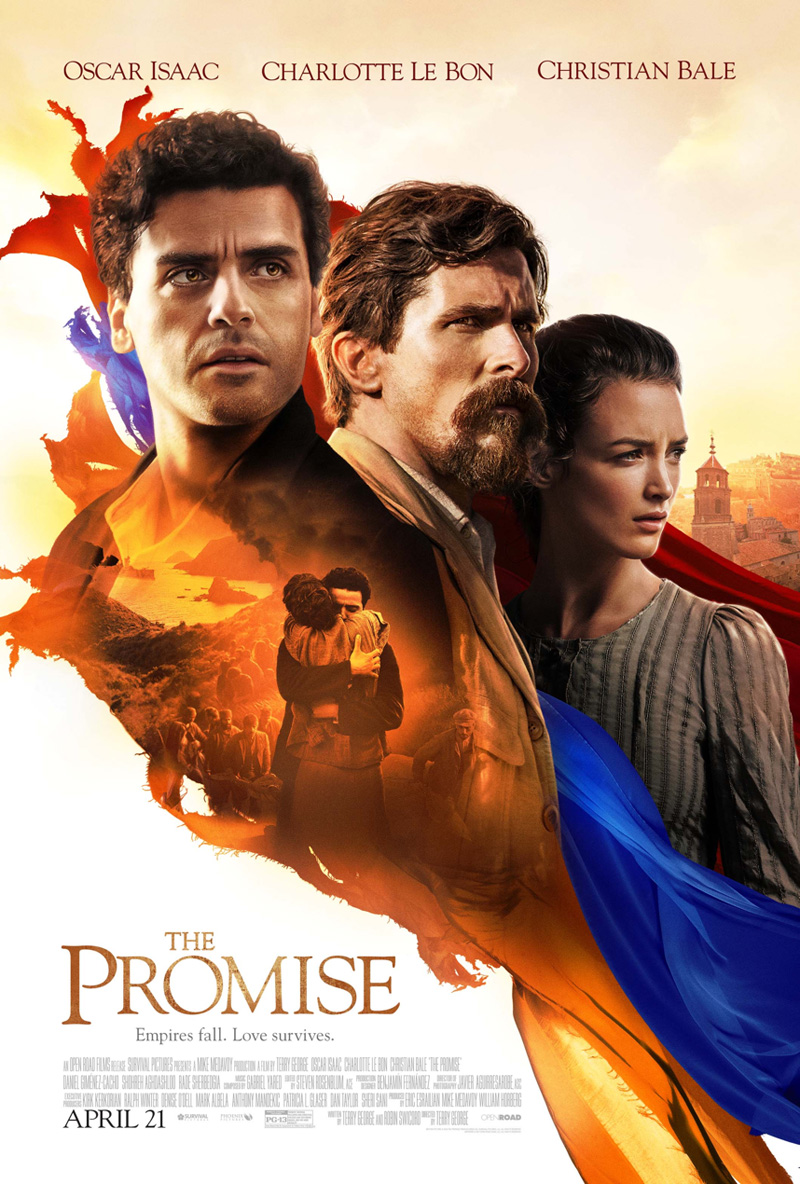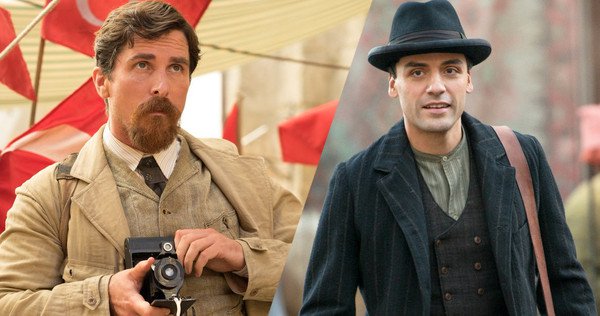THE PROMISE Review

Director: Terry George
Genre: Historical Drama
Year: 2017
Before I go any further, I would like to establish that at the end of the day, I am genuinely pleased that THE PROMISE is available to watch in theaters across the nation. For those not in the know, both the Turkish and American governments refuse to officially acknowledge the Armenian Genocide, the systematic elimination of 1.5 million Armenians at the hand of the Ottoman Empire, to this day. Coupled with the fact that the Holocaust happened less than 30 years later on a much larger scale, the Armenian Genocide is still chronically overlooked in history and culture at large. Now, that statement comes with the caveat that I think it is foolish to hate modern Turks for the transgression of their ancestors, and xenophobia is unattractive on whoever wears it, but I digress. It would be an understatement to claim that I’ve never been the model Armenian, and truly don’t give much credence to nationalism in general, but seeing the overjoyed reactions from the community at large over the release of their story finally being told makes it hard to remain entirely aloof and cynical. THE PROMISE deserves to exist, and should be applauded for making large strides to dismantling a century of denial and ignorance; however, that doesn’t make it a particularly deft or meritable film.
In 1914, during the steady buildup to World War I, Mikael (Oscar Isaac) dreams of becoming a medical student from his Armenian village of Sirun. Sent to Constantinople thanks to the dowry given to him by a neighbor whose daughter he’s to marry, Mikael heads to the big city, where he meets Ana (Charlotte Le Bon) and her boyfriend, the American Press reporter Chris Myers (Christian Bale). Mikael is able to escape forced conscription in the Ottoman Army thanks to his friendship with the Turkish Emre (Marwan Kenzari), but is eventually rounded up and sent to a prison camp in April of 1915. From there the story follows Mikael attempting to reunite with Chris and Ana, who he’s fallen in love with, and escape the region, while Chris does his best to expose the horrors of the genocide to the world at large.

A strikingly dark indie folk biopic
Many of the film’s largest problems can be explained by the fact that this is the first time a polished, “Hollywood” version of the story has been told. Interestingly enough, a nascent La La Land produced RAVISHED ARMENIA, a film involving the Armenian Genocide, in 1919, but since then, the well has dramatically dried up. As such, THE PROMISE finds itself taking up the difficult mantle of quite literally introducing the topic to a nebulous and fickle American viewing demographic, and as such, has to paint in banal broad strokes to ensure accessibility. These same broad strokes are what causes the film to often focus on the melodramatic love triangle at the core of the narrative in lieu of any nuanced exploration of the conflict itself, and are presumably responsible for the inclusion of Bale’s character at all. Since it’s obligated to attempt to juggle several disparate elements and give the old college try to developing them fully, any sense of pacing is thrown out the window, with choppy, disorienting time jumps and pacing issues plaguing the film throughout, in addition to an unfortunate predilection for characters delivering an abundance of exposition.
For better or worse (most likely worse), Chris’s side of the narrative actually ends up being the more skillfully woven one. The most morally ambiguous character the film has to offer, Chris’s desire to document a tragedy-in-the-making can be considered noble, but is also steeped in voyeurism and a clear position of privilege. Thankfully, one of the film’s most powerful moments consists of Mikael confronting Chris with this exact dichotomy, allowing THE PROMISE to sidestep the traditional white savior trope in the process. As such, it’s much easier to appreciate the inherent tension of Chris attempting to claim press immunity while still clearly reporting the aggressive and illegal actions of the Turks, and a scene between him and the Turkish general who finally catches him is an easy highlight.
However, it’s obviously Mikael and Ana’s story that audiences are responding to the most, and I can certainly admit that it’s likely exactly what the majority of theater-goers paid for. Tying in with my point above about THE PROMISE having to be as clear-cut and accessible as possible considering its burden to tell the story for virtually the first time, Mikael and Ana are portrayed as sympathetic saints, paragons of love and hope that we can do nothing but root for. I’m not saying that they had to give a genocide refugee a dark side or a vice to struggle with, but there’s built-in tension considering the fact that Mikael has fallen in love with a woman who is not his wife that isn’t properly explored. This is briefly dealt with in another standout scene, wherein Mikael escapes the prison camp and makes it back to Sirun, only to visibly be uncomfortable when he’s informed that he’s to marry his betrothed that evening and escape with her, but George wraps this up in a quick lecture from his mother, Marta (Shohreh Aghdashloo). I found it all a little too easy, especially when Mikael and Ana literally stop to save a missionary full of orphans on their way out of Turkey, but the Oscar bait crowd is evidently lapping it up.
On the topic of Oscar bait, while I don’t personally believe that it will be paid much attention to come awards season, THE PROMISE clearly attempts to shoot for the stars. Even overlooking Terry George’s previous successes with HOTEL RWANDA, the film has soaring, landscape-centric cinematography, two of the bigger male leads in Hollywood, and a summarily succinct slant and message that’s easy to rally behind. However, and I do recognize this is cynical, but the fact that its imagery of tragedy feels so familiar can’t be overlooked. I’m not a monster; I felt the requisite tugs at the heartstrings when shown scenes of Turks looting and pillaging Armenian business and people over Armenian choral music, in addition to the centerpiece of the film, wherein Mikael discovers his entire village of Sirun killed and left to rot in a river, but my most controversial point is that if you simply changed the location and the costumes everyone is wearing, you could convince me that this is a Holocaust film. While a strong point in favor of the argument that history repeats itself, the fact that we’ve been so inundated with similar stories from WWII softens the blow of anything we see here.
Am I happy I saw THE PROMISE? I can’t say that I regret it. As I mentioned at the start of this review, it’s certainly a step in the right direction that Hollywood is taking a chance on clearly stating that the Armenian Genocide happened and giving it a proper, star-studded treatment. In a parallel I never thought that I’d make, in my recent review of the utterly unrelated PHOENIX FORGOTTEN, I close with saying that I didn’t love the movie at hand, but I think it demonstrates a strong template on how to proceed further; my sentiments on THE PROMISE are nearly identical. I look forward to seeing more films about the Armenian Genocide, and I look forward to seeing them more successfully rendered than what is presented here.
Verdict: Do Not Recommend



